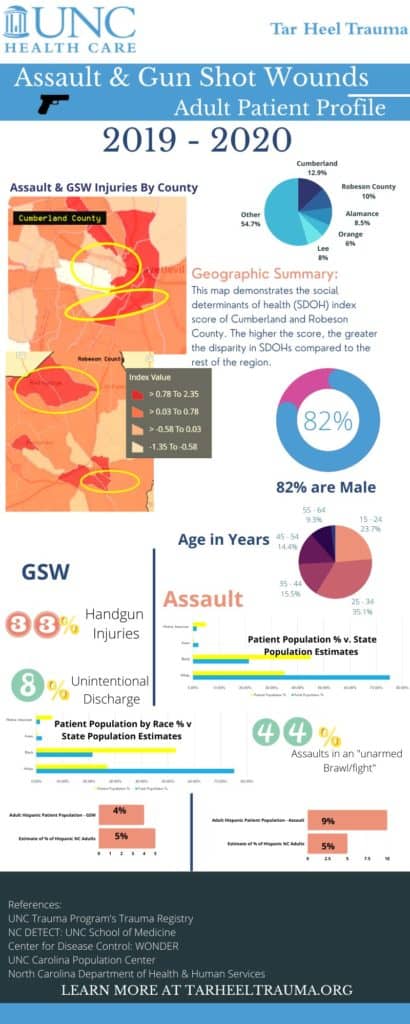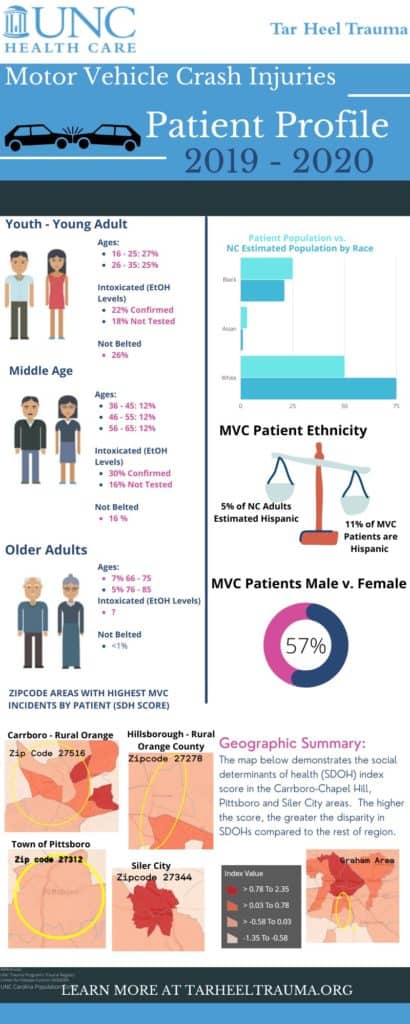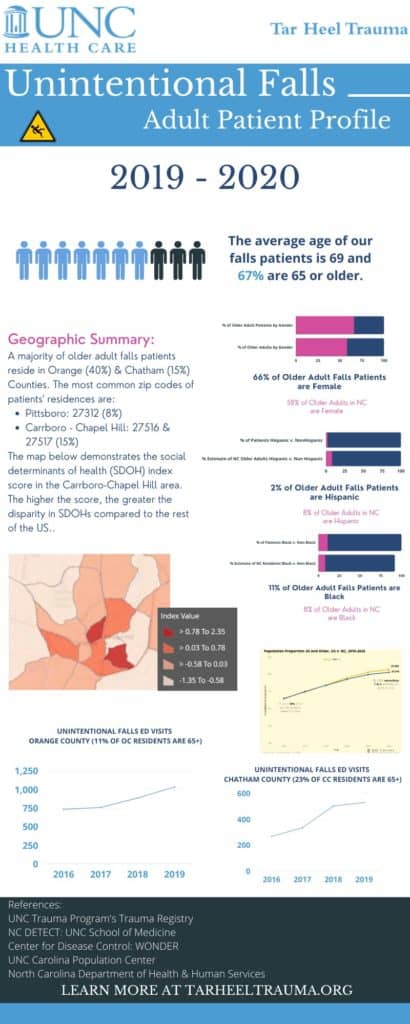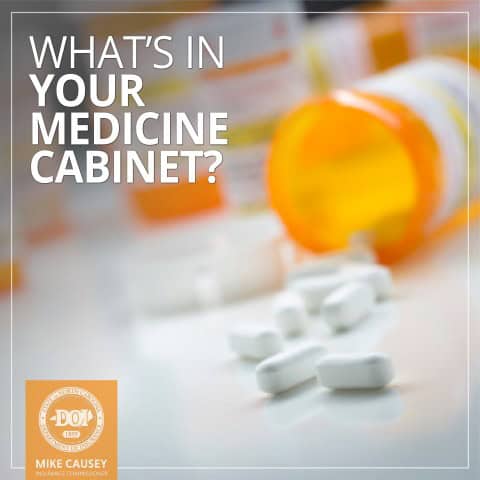Check out UNC Trauma Program’s New Patient Infographics to Learn Who May Be Most At Risk For Unintentional Falls, Car Crash Injuries, and Intentional Injury



by unctarheel
Check out UNC Trauma Program’s New Patient Infographics to Learn Who May Be Most At Risk For Unintentional Falls, Car Crash Injuries, and Intentional Injury



by unctarheel
UNC Trauma Program ‘Health & Wellness Communication’ Summer Internship Opportunity
UNC Trauma Program is housed within UNC Trauma Center of Chapel Hill, NC. Our vision is to use a public health approach to prevent injuries and reduce the number of traumatic deaths in our region.
The internship opportunity is for an undergraduate student seeking experience in health and wellness communication. The intern will gain hands on experience implementing social media strategies to spread health education messages to a variety of targeted audiences, contribute to health education websites, creation of health education content reach targeted audiences including but not limited to podcasting (pitching episode ideas, planning and structuring the interviews, conducting/co-conducting interviews, editing, and disseminating), drafting media releases, and designing infographics. Other duties may include providing technical support in preparing communication analysis reports and other communication items for leadership.
Feedback from previous interns from UNC Hussman School of Journalism and Media.
“The internship offers a great amount of flexibility and freedom to work on various projects and bring your own ideas. As a result of my internship work, I was able to enhance and broaden my skill set by crafting social media content, writing stories that were published, creating podcast episodes, and designing graphics. The internship was an enjoyable experience because it was tailored to my interests, and I felt my contributions were valued.” – UNC Trauma Intern Spring 2021
“My internship with the UNC Trauma Center was an excellent way to gain experience with a multitude of different editing platforms and web development tools. This internship drew me in due to my interest in healthcare and solidified my interest in communications/public relations. I truly enjoyed the work I was doing every day because I knew I was helping communicate important information about safety education and was given tasks that were big picture and strategic. “ – UNC Trauma Intern Fall 2020
Specific Duties & Reporting Structure
The intern will report directly to the Injury Prevention Coordinator of the UNC Trauma Program who has a B.S. in Journalism with a Concentration in Public Relations and a Masters in Public Health in Health Behavior for UNC Gillings School of Public Health.
Hours will be 10 – 15 (negotiable dependent on the right candidate’s availability). This is an unpaid opportunity but we guarantee you will learn very valuable, tangible skills. The candidate will not only walk away with a portfolio of digital media products but will also have the opportunity to pitch and try new and innovative ideas.
Specific duties will include (based on right candidates interest some tasks can be prioritized over others):
by anoadmin
May is National Bicycle Safety Month.
In North Carolina, non-profits and local agencies will be giving out bike helmets donated by the North Carolina Department of Transportation to kids all month.
Helmets have prevented many serious injuries and deaths in the past 20 or so years. But a grieving mother points out, there’s much to more to it than just helmets.
“I talk to them about the importance of really educating children about bicycle safety,” Luly Beckels told ABC 11.
Beckles’ 7-year-old son was wearing a properly fitted helmet when he was hit by a drunk driver whose SUV was on the wrong side of the road.
May 20, 2021 will mark 15 years since the tragic crash near their Winston-Salem home.
Beckles has spent much of that time trying to honor Josh’s memory by teaching and preaching bike safety.
“Your children need to learn the rules of the road. Your children need to learn hand signals if they’re going to get on a bike,” she said. “Your children need to understand and you do too that you’re not giving them a toy. You’re giving them a vehicle. Under state law, a bicycle is a vehicle.”
Dr. Scott Elton agrees saying, “Getting those messages out is really important, and so having a month devoted (to bike safety) is important.”
Elton is well aware this is National Bicycle Safety Month because he’s a bike enthusiast who learned how to ride as a child in the 1970’s.
“Growing up, of course, helmets were not part of the landscape.”
But bicycle head injuries were, even though it wasn’t talked about much outside medical circles.
Those kind of injuries are something Elton knows a lot about. He’s the head of pediatric neurosurgery at UNC Hospitals.
So he’s seen plenty of bike related cases and, after 20 years in the operating room, he’s also seen how helmets can make a difference.
“Because helmet use has picked up over my career, I’ve seen far fewer fatalities with the use of helmets,” Elton said adding he’s seen fewer severe head injuries with helmets.
For Beckles, however, there’s a caveat.
“Really, the key is properly fitted helmet,” she said.
She hopes parents will take the time to help their children learn to do that and to learn other bike rules. She said Bike Safety Month is the perfect time to do that.
Although her son’s helmet couldn’t save him in a collision with an SUV, it did buy some important time, according to the still grieving mother who said that extra few hours, “…allowed me and his family, our family to say goodbye.”
Source : ABC11
by unctarheel

It is no secret that alcohol and certain activities don’t mix such as operating heavy machinery, swimming and driving. Alcohol’s immediate side effects such as delayed reaction times, impaired coordination and loss of critical judgement far too often lead to injuries and even fatalities.
Over 12% of trauma patients tested for alcohol at UNC Medical Center from 2019-2020 had alcohol in their system at the time of their injury, with 25% of patients ages 16 to 21 testing positive. The percentages are likely even higher since more than half of the patients were not tested for alcohol. Orange County residents under the influence of alcohol have sustained traumatic injuries from burns, falls, assaults, stabbings and wrecks.
However, despite the known effects of alcohol and the injuries that result, it is not often viewed as a dangerous substance. Alcohol is the most frequently used drug and, as a result, has become a normalized aspect of daily life for many. But the reality is that more teens die as a result of alcohol use than all other illicit drugs combined.
On average, youth try alcohol for the first time at 13, when they are in middle school. The vast majority of North Carolina’s youth — 94% — say underage drinking is a problem, according to Talk It Out NC. The 2019 Youth Risk Behavior Survey found that among high school students in North Carolina, 24% drank alcohol in the past 30 days and 13% binge drank.
While not everyone who drinks does so at heavy levels, studies show underage drinkers are more likely to engage in binge drinking, which involves having four or more drinks at a time.
Underage drinking, especially binge drinking, is harmful on the brain’s development and can lead to consequences such as blackouts, unplanned and unwanted sexual activity, fights, accidents and driving while intoxicated. The immediate effects of alcohol are not the only concern for youth since research shows that youth drinking puts individuals at three times the risk for alcohol-related injuries throughout their lifespan.
North Carolina loses at least one person per week due to underage drinking.
Josh Helm, an 18-year-old freshman at UNC Charlotte from Hillsborough, died from underage drinking in 2014. His mother, Vicki Helm, said she learned her son spent the day drinking with a friend in his dorm and ultimately fell out his seventh-floor window to his death.
She said his binge drinking left him incapacitated where he was no longer capable of seeing what was dangerous. Binge drinking is not uncommon, as 1 in 6 teens binge drinks, according to Talk It Out NC.
Helm said the current drinking culture of people overconsuming and becoming blackout drunk is troubling and tempts fate every time they do so.
“All the kids that come to the University of Chapel Hill or Charlotte or State, they have big dreams. And yet, drinking can take it all away,” Helm said.
In the aftermath of her son’s death, Helm said she nor her son were prepared for the drinking culture he would be surrounded by.
With her younger son headed to college shortly after, she said she navigated conversations about drinking differently. Instead of saying “Just don’t drink,” she turned to providing scenarios and evidence of what alcohol does to your body.
Helm emphasized the importance of parents and children discussing drinking openly and urged parents to initiate the conversation at an early age. While she said children may be reluctant to listen, short and frequent discussions can have an impact on your child’s decisions about alcohol.
In fact, 84% of middle school students surveyed said they felt parents talking with them more about alcohol would help stop underage drinking, according to Talk It Up NC.
But Helm doesn’t want conversations about alcohol to end once a child reaches the legal drinking age. She said ongoing conversations about drinking habits between people of all ages is important because it’s impossible to know when drinking may become a problem. However, individuals who start drinking before age 15 are five times more likely to develop alcohol use disorder.
Regardless of age, alcohol consumption can have physical, emotional, financial — even fatal — consequences.
“Each person has to see themselves as my son, and they have to see me as their mom,” Helm said.
It’s the harsh reality of loss she wants people to reckon with so behaviors and understandings shift from alcohol as a means to have fun and relax to a serious substance that could cost you your life.
The following column was published in print in News of Orange County. It appeared in Orange Partnership for Drug & Alcohol Free Youth’s monthly column “Talk it UP!”
Story written by Rachel Crumpler, UNC Tar Heel Trauma Program’s communications intern.
by unctarheel
Teenagers are known to be greater risk-takers and believe they are invincible. Some teens may experiment with alcohol and drugs recreationally or use them to self-medicate. But all drug and alcohol misuse has the potential of becoming dangerous and deadly from overdose. Even if a teen won’t be using themself, they will likely be around a friend who is, be a bystander, or see someone post about it on social media. With the prevalence of substance misuse and the recent rise in overdoses, it is crucial to know about the Good Samaritan Law.
Under North Carolina’s Good Samaritan Law enacted in 2013, a person can seek medical assistance by contacting 911, a police officer, or EMS for themself or someone else experiencing a drug overdose without fear of prosecution for the following:
Currently, the law requires the caller to provide his or her name to law enforcement or EMS to qualify for legal protection. While it may feel uncomfortable to share your name, you will not get in trouble and it is far more important to help the person in need.
“In an overdose situation, minutes count,” Orange County Sheriff Charles Blackwood said. “We do not want someone to delay calling for help out of fear of legal action. The Good Samaritan Law addresses this.”
Fear of getting in trouble with law enforcement or parents is what deters people from taking action and calling for help. Mary O’Donnell and Julie Boone Cummins know this all too well. Both mothers lost their sons, Sean O’Donnell and Boone Cummins, in the summer of 2017. They believe it’s possible their sons would still be alive if their friends knew about the law and sought help.


Sean died June 4, 2017. He was out drinking at Sugar Lake in Chatham County with friends who at some point left as he passed out. Alone at the quarry, he fell into the water and drowned.
Boone died July 19, 2017. Friends dropped him off by the quarry after he had taken high doses of Xanax. They thought he would be fine, not realizing the dangers of the drug. As he was at the quarry alone, he sent texts and social media calls for others to join him to memorialize Sean, his best friend. Cummins said she believes Boone rolled into the water and drowned due to his inability to swim in his compromised condition.
“There were so many points during that night and so many different people who could have called,” Cummins said.
In honor of their sons, both families dedicated themselves to raising awareness about the Good Samaritan Law. In sharing what happened to their sons, they have attached faces and names to the law in a way they hope helps kids remember.
While awareness of the Good Samaritan Law has improved since 2017 in part due to the two families’ advocacy and their talks at area high schools and sororities and fraternities, they still think more needs to be done.
O’Donnell said she believes education on the Good Samaritan Law should begin in middle school so teens are informed prior to the peak time of experimentation in high school and college. After first learning of the law, she said there needs to be continued, periodic education in order for teens to absorb the information.
When employed, the Good Samaritan Law is powerful and can save lives. But people first have to know about it. Familiarize yourself with the law and tell others about it.
“You will not be held accountable if you call for yourself or someone else in a medical crisis,” Sheriff Blackwood said. “We are not just about enforcing laws, we are also about saving lives.”
If there is an overdose situation, make the 911 call. As both mothers say, “It’s just a no-brainer.”
The following column was published in print in News of Orange County. It appeared in Orange Partnership for Drug & Alcohol Free Youth’s monthly column “Talk it UP!”
Story written by Rachel Crumpler, UNC Tar Heel Trauma Program’s communications intern.
by unctarheel

Operation Medicine Drop is a free drug take-back program that provides an opportunity for community members to dispose of expired or no longer needed over-the-counter and prescription medications in a safe and secure way. Since the first take-back event in North Carolina in 2010, Operation Medicine Drop has collected more than 232 million pills and helped stop prescription drugs from falling into the wrong hands. Last year, Operation Medicine Drop collected and disposed of 32 million pills across North Carolina, saving countless lives.
Medications not properly disposed of may end up in the wrong hands or contaminate the water supply, so please take advantage of upcoming Operation Medicine Drop events.
Bring any unused or expired medications to the events so they are properly disposed of.
While it may not seem like a big deal to have medications lying around in the home, it could easily lead down a tragic path of addiction or unintentional poisonings.
Take the simple step of disposing of medications!

101 Manning Dr.,
Chapel Hill, North Carolina
Call us: +1 984-974-2430
Email: tarheeltrauma@unchealth.unc.edu
